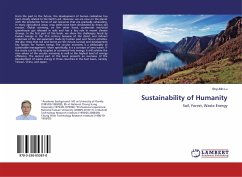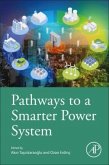This is a comprehensive exploration of the diverse challenges and solutions related to environmentalism and sustainability. It bridges the gaps between theory and practice, offering practical insights for academics, policymakers, and change agents. It also inspires informed action and collaborative efforts for creating a sustainable future, offering new knowledge to those who care deeply about the planet and humanity's future.
The book begins with the evolution of environmentalism; tracing how ecological awareness has shaped global movements and policies. It also delves into theories of sustainability, demonstrating their relevance in addressing contemporary environmental crises. Central to the discussion is the concept of resource inequality, revealing how disproportionate resource access hinders global development and sustainability. It also explores the sustainable development goals (SDGs), presenting them as vital frameworks for policy and action, alongside climatechange mitigation strategies like renewable energy, carbon sequestration, and biodiversity conservation. In the context of social equity and environmental justice, it addresses global disparities, underscoring the need for inclusive and fair solutions.
Technological innovation is presented as a key driver for transforming economies into more sustainable models, including the circular economy and green finance. Furthermore, the book highlights behavioral change, mental health, and well-being as integral to advancing environmentalism.
Corporate responsibility and global cooperation are examined for their roles in driving collective action, and the book emphasizes the importance of these stakeholders in addressing the environmental crisis. It also introduces the epistemology of the development economy, providing a fresh lens on sustainability that can inform both academic inquiry and practical applications.
The book begins with the evolution of environmentalism; tracing how ecological awareness has shaped global movements and policies. It also delves into theories of sustainability, demonstrating their relevance in addressing contemporary environmental crises. Central to the discussion is the concept of resource inequality, revealing how disproportionate resource access hinders global development and sustainability. It also explores the sustainable development goals (SDGs), presenting them as vital frameworks for policy and action, alongside climatechange mitigation strategies like renewable energy, carbon sequestration, and biodiversity conservation. In the context of social equity and environmental justice, it addresses global disparities, underscoring the need for inclusive and fair solutions.
Technological innovation is presented as a key driver for transforming economies into more sustainable models, including the circular economy and green finance. Furthermore, the book highlights behavioral change, mental health, and well-being as integral to advancing environmentalism.
Corporate responsibility and global cooperation are examined for their roles in driving collective action, and the book emphasizes the importance of these stakeholders in addressing the environmental crisis. It also introduces the epistemology of the development economy, providing a fresh lens on sustainability that can inform both academic inquiry and practical applications.









